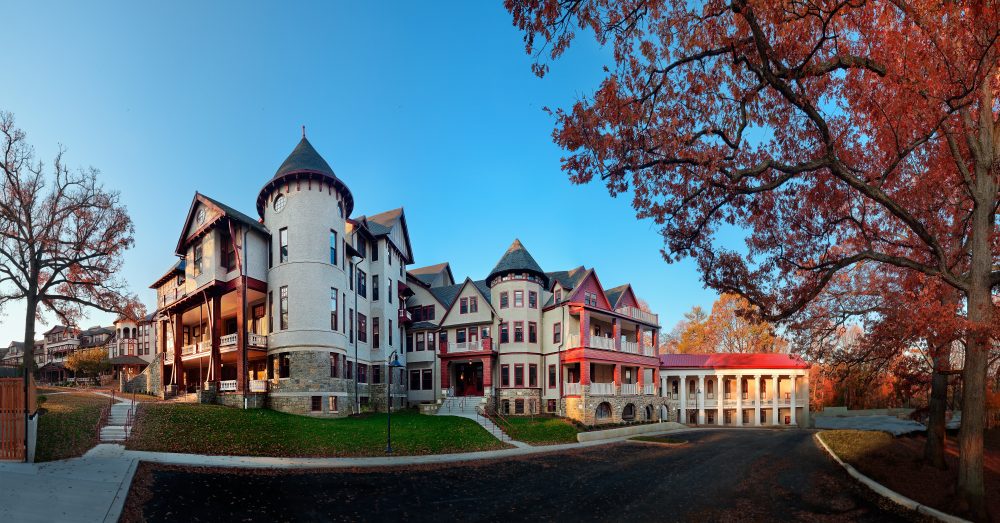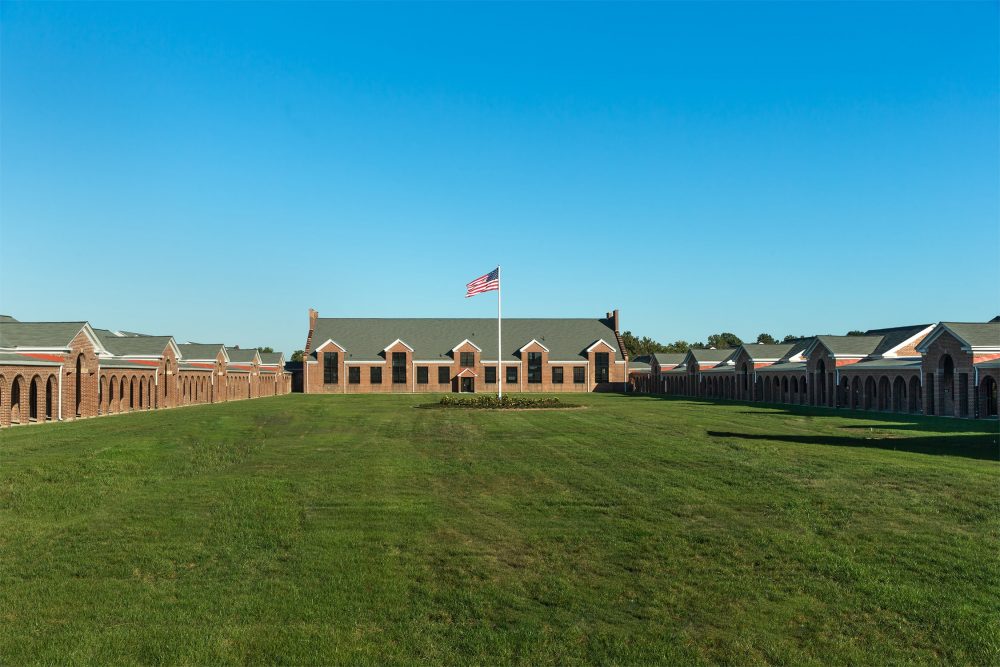Hidden away in the suburbs of Washington, DC is an unexpected treasure that offers historical significance and, upon first glance, seemingly decrepit buildings. Thanks to The Alexander Company, this project is far from hopeless and will soon be an important part of its Silver Spring, Maryland, neighborhood.
After visiting the National Seminary Project, however, the quality and vision of the company’s efforts are evident and promise to give rise to comfortable, welcoming, and unique living spaces in this historic landscape.
An Important History
Founder Randy Alexander set the tone for the company in 1982 when he completed the first project: flipping an old house in Madison, Wisconsin, where the company still has its headquarters. “It was the worst house on the block and he turned it into the best house on the block,” said Daniel Peterson, Director of Communications. Randy had high hopes that this project would earn a lot of money but the location proved different and taught him the lesson: “location is key.” Perhaps a perfect example of this tenet is their current National Park Seminary project, located on a mystic, 12-acre wooded glen just inside the DC beltway.
The Alexander Company specializes in urban infill, new construction, brownfield revitalization, and historic preservation. The company also prides itself on the GSA (General Service Administration) surplus properties it has recently redeveloped. These government surplus buildings are reused for residential or commercial purposes rather than being converted inefficiently by the federal government at the taxpayer’s expense.
Over the last 25 years, the company has completed over 250 projects, working closely with city, county, state, and national officials to bring marked improvement to urban areas in need of redevelopment. Concentrating their efforts in the Midwest and east of the Mississippi River, The Alexander Company enjoys a vast geographical influence in which they can leave their mark. With approximately 45 employees, The Alexander Company oversees general contractors while serving as a master developer that provides services in financing, sales, property management, architecture, and planning.
Projects
A shining example of a former GSA property that is being redeveloped is the National Park Seminary. Dating back to 1887, the buildings enjoy a diverse history that is being preserved thanks to the vision and perseverance of The Alexander Company. Originally serving as a retreat for wealthy DC residents, the campus was converted into a women’s finishing school in 1894 during which time a building program was instituted, bringing together an intriguing mix of international architectural styles influenced by the 1893 World’s Columbian Exposition: an English Castle, dutch Windmill, Italian Villa, Swiss Chalet, Japanese Pagoda, and Spanish Mission are just a few.
During World War II, the army took up residence and used the site as a rehabilitation center for returning amputees and veterans, an identity the army maintained through the late 1970’s. Deeming the property surplus to its needs, the army twice tried to have the site demolished; however, local preservation groups blocked the proposed demolitions. In search of more adequate buildings, the army literally left the site overnight, leaving steam and water pipes on, resulting in heavy structural damage.
When the Alexander Company was awarded the site’s redevelopment in 2003 because of a plan that called for saving all of the historic structures, walls, ceilings, and floors were caving in, leaving a collection of severely dilapidated structures. This vast, 32-acre campus has undergone an astonishing aesthetic change over the last five years, as The Alexander Company has transformed the various buildings into an eclectic mix of 66 apartments and 50 condominiums, all of which have different floor plans. Even the window sizes vary drastically among the apartments and condominiums, requiring specific measuring, ordering, and installing of replacements. Community spaces will also welcome its new residence. A gothic ballroom, which features one of the world’s only functioning Victrola speakers, will be used for community events approved by the condominium association. The historic homes are adorned with historical features including decorative fireplaces, vaulted ceilings, sparkling finishes, and original crown moldings. The homes seamlessly blend these historic features with modern amenities that include granite counter tops, hardwood floors, stainless steel appliances, and Kohler fixtures and bath hardware. The Alexander Company is also working to improve the surrounding acreage by restoring statuary and walking trails throughout the 12-acres that surround the site. Providing easy access to the beltway and Rock Creek Park, National Park Seminary also features an on-site fitness center and computer center, bringing today’s modern amenities to a site that dates back over one hundred years.
A Thoughtful Mix
Acknowledging the challenges for lenders to finance projects, The Alexander Company has been resourceful in its financing practices: “We use a lot of state, federal, and historic tax credits, brownfield credits, low-income housing tax credits, and private investments, so we have been able to fund projects a number of ways,” said Peterson.
“We also have a thoughtful mix of apartments, work force housing, condos, and commercial real estate – not just owner occupied residential units,” added Peterson. “Of course, we would like to see the economy turn around, but we are not gasping for air.”
Seeing the all-around benefits of redeveloping GSA surplus properties, The Alexander Company plans to increase this growing aspect of its business. When the government attempts to retrofit historic buildings into modern office space, the costs are significantly higher than if the private sector burdens the cost. “The government says the private sector doesn’t have the financial means or will to take on projects of this size, but here we are with two examples of being able to do this,” said Peterson.
The Alexander Company is also drafting the Master Plan for Laurel Hill in Fairfax, Virginia a former GAS property know as Lorton Prison. The GSA transferred the 79-acre site, originally built in the 1920s, to Fairfax County in 2002 who turned to Alexander Company as a consultant in 2008 for their expertise as a master planner. Slated to become an important mixed-use development for the community, the project is comprised of 41 buildings including former dorms, auditoriums, a hospital and gymnasium.
Saving such projects is a benefit for the community, absolving some of the burden on the tax payers and salvaging an important and often historically-admired piece of the community’s fabric. Because government buildings often shut out the public, Alexander Company’s ability to reintroduce them to community with a new function re-invigorates the neighborhoods.
Green Building in their Nature
The Alexander Company’s projects are, by nature, the epitome of sustainable building. By not tearing down and instead reusing existing buildings and infrastructure, green space is left untouched. The company is playing its role in the green movement, investing as much as possible in ensuring their work will last for generations.
Despite today’s’ rocky market and painful economic situation, The Alexander Company has a plan: with their eyes set on GSA properties and their ever-present foundation of adaptive reuse projects, the company is sure to continue making an important contribution to the landscape of our country, preserving history wherever possible and improving the horizons of each neighborhood along the way.


